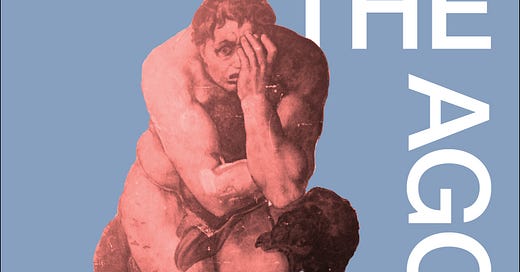The Agonies comes out tomorrow, March 25 (order here). Simply put, this is a brilliant debut novel from the remarkably talented Ben Faulkner.
In agonizing detail, The Agonies bares a spirit of honest introspection, a spirit that is far too often sacrificed at the throne of moralizing didacticism in contemporary fiction.
Or, in the words of Manuel Marrero in his recent review in Expat Press, “It’s a book so great you don’t deserve it. Culture can’t afford to overlook it . . . I commend all who bet on The Agonies and made it a bracing reality as hastily as possible.” (Read the full review here.)
This short excerpt won’t do the narrative justice. You should buy the book and read the whole thing in one sitting, or maybe two. You won’t regret it.
An Excerpt from THE AGONIES
by Ben Faulkner
MOTHER
My mother was a feminist. She critiqued society by taking a basically benign image and finding some flaw in it by way of viewing it through a lens. In a certain way I continued this project but in a more radical and total way, albeit completely private and with no practical application.
I was always in my own little world, not paying attention to the people around me. Now my mother is gone, and I don’t know anything about her. These are the things I know . . .
When I was young, I thought her behavior was normal. In families, even the most heinous behavior has the feeling of normalcy, it is the water you breathe, the air you swim in, the other way around, but you know what I mean. The water you breathe.
I remember being seven years old. Maybe eight. I walked up to her to hold her leg—I was frightened by something—and she pushed me away, held me at arm’s length as I robotically swam toward her, my arms and legs moving frantically but going nowhere, like a dumb robot grinding against a wall.
Did I make this up? Where were we? I remember a green bush, like a hedge maze. Are memories that old even reliable, or just as likely a fabrication, derived from something observed in a movie, or experienced in a dream. I remember it as abuse or neglect, but she must have had a reason, right? The image has no moral heft; it is merely confusing.
Think of someone you know who died, someone from your distant past—as distant as your past can go, a stubby cave in my case, but still murky in its shallow recesses. How concrete do the memories seem? If someone told you with some authority that those events never occurred, that the characterization you retain of a vanished person is a distortion, how easily might you believe them? Now think of someone from even longer ago. How real are they in your memory? Are they solid at all?
I haven’t seen my mother in five years—actually longer—and I will never see her again. The distance between us will only grow, the memories becoming blurry and protean, like snapshots seen through gel—expired lubricant in a medicine cabinet, flaky and discolored.
When a child is born, what obligations begin? Are you required to maintain a clean home, a standard of upkeep? Should you give up weird sex behaviors, or just keep them completely secret? If the child fails, where does the blame lay?
I am trying to remember my mother. I would like to write about her, but I don’t feel anything. She went on a book tour in 2016. She was assaulted when she was fourteen, that break-in she wrote an essay about, what else . . .
Her favorite book was a novel called Speedboat by Renata Adler. She would only read women writers. (I always found that tacky—like a fake daring pose. “I only read women writers. Please clap.”) She wore black. She tried to maintain an artistic appearance. She pretended to be indifferent to appearances but was very interested in her own appearance. She got a facelift, something like that, some kind of procedure to have the skin around her chin pulled more tightly.
I remember the bandages, and the straw-like tubes for draining.
Ben Faulkner is a former child actor. He lives in the Midwest. The Agonies is his first novel.
"The Agonies burns down the world with its artistry, poetic derangement, and miracles of unexpectedness. Ben Faulkner stands shoulder to shoulder with Denis Johnson and Thomas Bernhard."—BRUCE WAGNER
"I enjoyed this book much more than I enjoy most contemporary books, including most alt-lit books. The author tells a story about a boy recovering from grief, and he invests in actually telling that story. It has the angst and melancholy you'd expect, but it's also suffused with hope. This kid, Armand, has so much life, so much vitality—he so desperately wants to want things—and that liveliness infects his narration, which is oftentimes shockingly insightful and humane. It was a pleasure to spend some time with this voice."—NAOMI KANAKIA, author of The Default World





